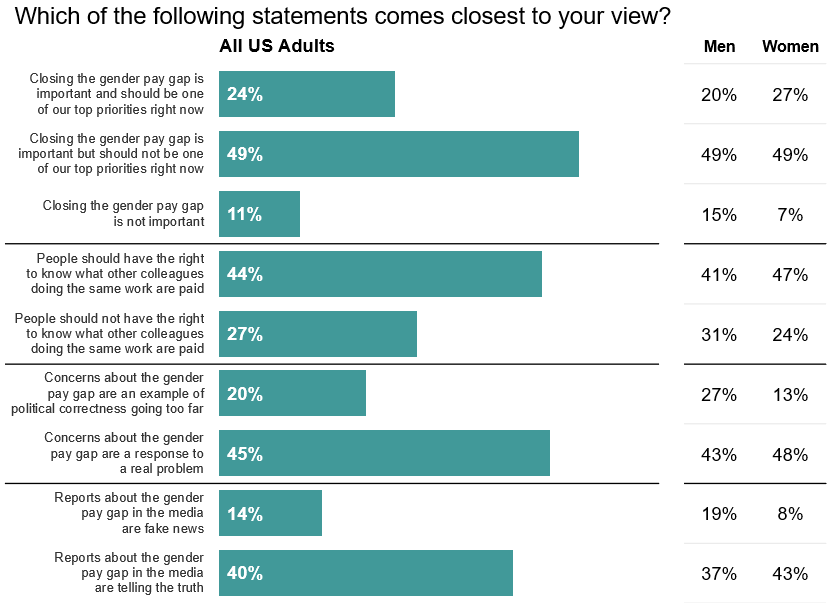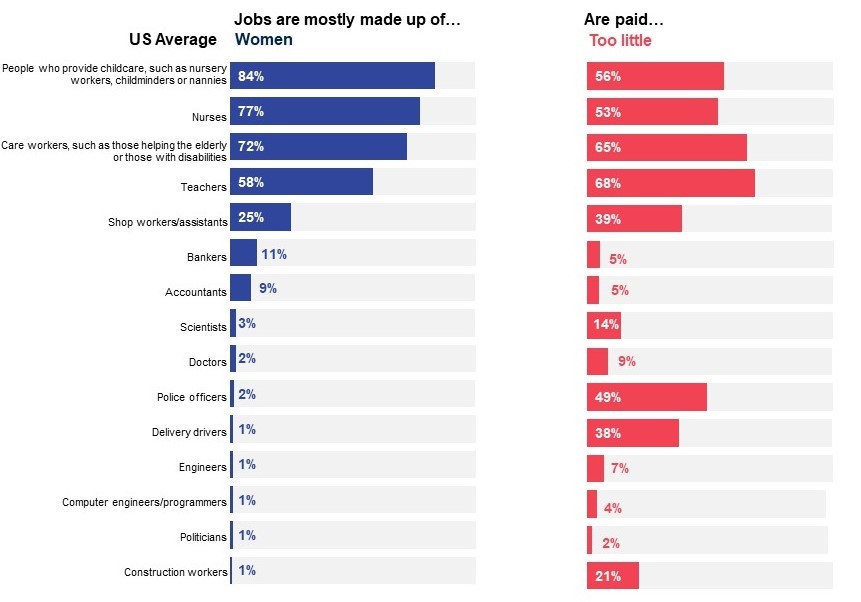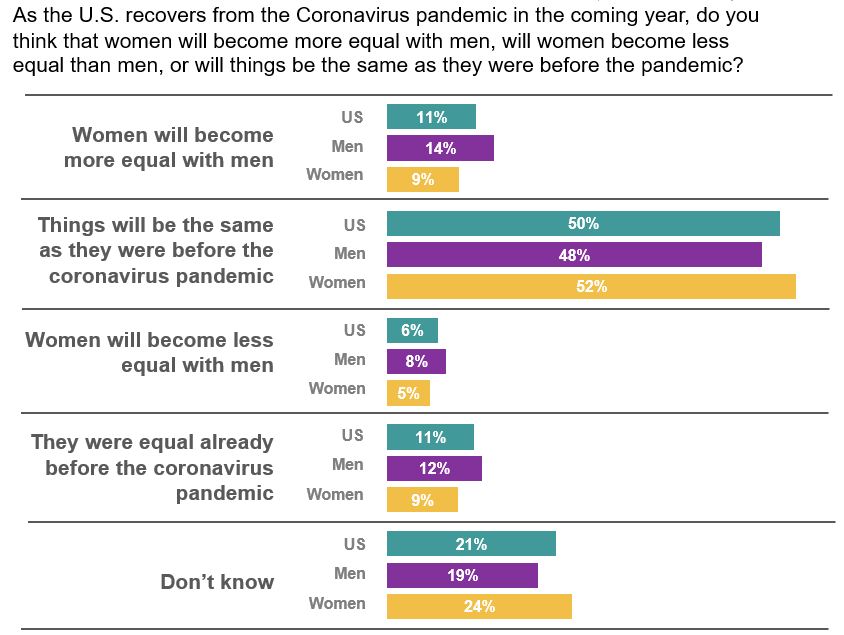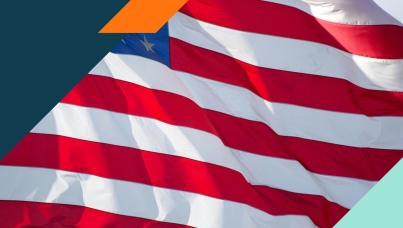For Americans, addressing the gender pay gap is important, but not a top priority
Washington, DC, March 7, 2021 — While three in four Americans believe addressing the gender pay gap is important, only one in four say it should be a top priority at the moment, according to a global Ipsos survey conducted in collaboration with the Global Institute for Women’s Leadership at King’s College London for International Women’s Day.
The survey was conducted January 22-February 5 among more than 20,000 adults in 28 countries, including 1,000 U.S. adults. It finds that, in general, Americans are not optimistic that women will achieve equality with men as the country recovers from the pandemic. Fewer expect women to be more equal to men (11%) than think things will be just as they were before the pandemic (50%). The views of Americans on this matter tend to mirror public opinion in other countries.
To ensure that the post-pandemic recovery addresses the unique challenges that women face, Americans, and other people across the world, prioritize flexible working practices, such as working from home or working part-time, better access to healthcare services, and better mental health support services.
In the United States, the pandemic economy has decimated sectors that predominantly employ women, like hospitality, retail, and healthcare, forcing women to exit the workforce at a higher rate than men. These challenges are compounded by a persistent gender wage gap that pre-existed the pandemic. According to the US Census Bureau, American women make 82 cents on average for every dollar that men make.
Detailed Findings
Perceptions on addressing the gender pay gap
A plurality of Americans (49%) believe that the gender pay gap is important, but that closing it should not be a top priority at the moment. Only half as many (24%) believe that it should be a top priority. Only one in ten (11%) believe that it is not an important issue.
- American men and women who believe that the gender pay gap is an important issue but not one to be addressed immediately are in alignment (49% among both men and women agree on this point). However, there is greater disagreement at the opposite ends of the spectrum, with more women than men (27% vs. 20%) who see this issue as a top priority, and more men than women who see it as insignificant (15% vs. 7%).
Compared to the rest of the world, Americans are among those least inclined to view the gender pay gap as a top priority: on average, across the 28 countries survey, 36% say it is a top priority, compared to 24% in the U.S.
- Addressing the pay gap is viewed with greater urgency in all other countries except for the Netherlands and Russia.

Fewer Americans (14%) believe that media reports about the gender pay gap are “fake” than believe they are real (40%), These numbers are fairly similar to the average for all countries (18% and 41%, respectively).
- American men are more likely to doubt the veracity of media reports about the pay gender gap (19%) than are women (8%).
- Some Americans show doubt about the pay gap in other ways, with one in five (20%) saying that they believe that reports on the gender pay gap are an example of “political correctness going too far.” They are outweighed however by the 45% who say that it is a “real problem.” Again, U.S. numbers are relatively close to the global average (19% and 50%, respectively).
- In general, more Americans favor greater transparency about how much people doing the same work are paid (44%) than not (27%). However, Americans are less likely to say one should have the right to know what colleagues earn than people in most other countries (the global average is 56%).
Perceptions of the kinds of roles women take on and whether their compensation is fair
Americans believe that women are most likely to hold jobs as childcare providers (such as nursery workers or nannies), nurses, teachers or shop workers.
- These roles are also among the top five jobs for which Americans say workers receive inadequate compensation. Teachers are most likely to be perceived as being paid to little, followed by care workers, nurses, police officers and childcare providers.

- Globally, people hold similar views of which roles are mostly held by women, identifying childcare providers (82%), nurses (68%), care workers (64%), shop workers/assistant (43%) and teachers (38%) as the roles most likely to be held by women. These five positions are also most likely to be perceived as inadequately compensated globally.
Perceptions on progress towards gender equality
Only about one in ten Americans (11%) believe that women will become more equal with men as the pandemic recovery occurs. Half (50%) believe things will remain the same as they were before the pandemic while 6% believe they will get worse. Just 11% of Americans believe that men and women “were already equal before the coronavirus pandemic.”
- American's views on these questions mirror global public opinion. On average across all 28 countries, 52% believe things will stay the same while 11% each believe that the recovery from the pandemic will result in men and women becoming more equal, that it will make them even less equal, and that they are equal already.

Perceptions on whether the pandemic has been better or worse for women
A majority of Americans believe that the pandemic has been equally negative for men and women (65%) when taking all the potential impacts into account, such as health, economic, and social. However, more (15%) believe that it has been worse for women than those who believe it was worse for men (6%).
- Americans’ views align with those of the global public: on average 64% across the 28 countries surveyed believe the pandemic has been the same for both men and women, 12% believe it has been worse for women, and 10% believe that it was worse for men.
Most important issues to ensure the pandemic recovery addresses issues facing women
To ensure that the post-pandemic recovery addresses the unique challenges that women face, Americans prioritize flexible working practices, such as working from home or working part-time (41%) and better access to healthcare services (33%). In third, Americans point to better mental health support services (30%).
- The inclusion of mental health services in the top three issues among Americans represents the most significant change from global perceptions of what would best serve women during the pandemic recovery.
- Globally, more flexible working practices also lead the list of priorities (40%), followed by more support for women and girls facing violence and abuse (36%), and better access to healthcare services (33%).
Characteristics political leaders need to successfully address the pandemic
Among 19 different characteristics that will enable politicians to succeed at handling the pandemic recovery, the three that Americans deem most important are: putting the country’s needs before politics (46%), honesty with the public (41%), and an understanding of the problems facing ordinary people (32%).
- Globally, the top three priorities are the same, in the same order, as they are in the U.S., albeit with lower percentages: on average, across all countries, 33% believe that politicians must be able to put their country’s needs before politics, 29% believe they must be honest with the public, and 28% believe they must be able to understand the problems facing their country.
About the Study
These are the results of a 28-country survey conducted by Ipsos on its Global Advisor online platform. Ipsos interviewed a total of 20,520 adults aged 18-74 in the United States, Canada, Israel, Malaysia, South Africa, and Turkey, and 16-74 in 21 other markets between January 22 and February 5, 2021.
The sample consists of approximately 1,000 individuals in each of Australia, Belgium, Brazil, Canada, mainland China, France, Germany, Great Britain, Italy, Japan, Spain, and the U.S., and 500 individuals in each of Argentina, Chile, Hungary, Hong Kong, India, Israel, Malaysia, Mexico, the Netherlands, Peru, Poland, Russia, Saudi Arabia, South Africa, South Korea, Sweden, and Turkey.
The samples in Argentina, Australia, Belgium, Canada, France, Germany, Great Britain, Hungary, Italy, Japan, the Netherlands, Poland, South Korea, Spain, Sweden, and the U.S. can be taken as representative of their general adult population under the age of 75.
The samples in Brazil, Chile, mainland China, India, Israel, Malaysia, Mexico, Peru, Russia, Saudi Arabia, South Africa, and Turkey are more urban, more educated, and/or more affluent than the general population. The survey results for these markets should be viewed as reflecting the views of the more “connected” segment of their population.
The data is weighted so that each country’s sample composition best reflects the demographic profile of the adult population according to the most recent census data.
Where results do not sum to 100 or the “difference’ appears to be +/-1 more/less than the actual, this may be due to rounding, multiple responses, or the exclusion of “don't know” or not stated responses.
The precision of Ipsos online polls is calculated using a credibility interval with a poll of 1,000 accurate to +/- 3.5 percentage points and of 500 accurate to +/- 5.0 percentage points. For more information on Ipsos' use of credibility intervals, please visit the Ipsos website. The publication of these findings abides by local rules and regulations.
For more information on this news release, please contact:
Nicolas Boyon
Senior Vice President, U.S., Public Affairs
Kate Silverstein
Media Relations Specialist, U.S., Public Affairs
About Ipsos
Ipsos is the world’s third largest Insights and Analytics company, present in 90 markets and employing more than 18,000 people.
Our passionately curious research professionals, analysts and scientists have built unique multi-specialist capabilities that provide true understanding and powerful insights into the actions, opinions and motivations of citizens, consumers, patients, customers, or employees. We serve more than 5000 clients across the world with 75 business solutions.
Founded in France in 1975, Ipsos is listed on the Euronext Paris since July 1st, 1999. The company is part of the SBF 120 and the Mid-60 index and is eligible for the Deferred Settlement Service (SRD).
ISIN code FR0000073298, Reuters ISOS.PA, Bloomberg IPS:FP www.ipsos.com



